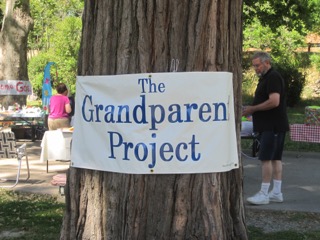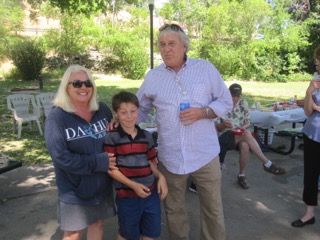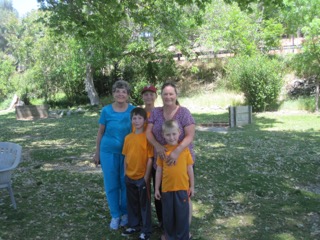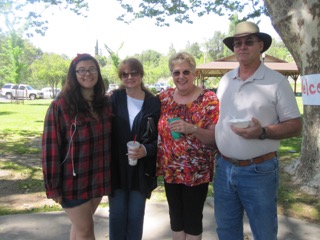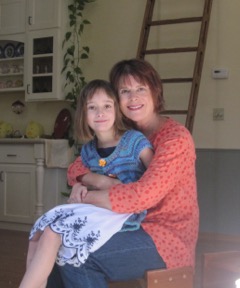
The Grandparent Project
Calaveras County Office of Education
If raising children isn’t hard enough, raising your grandchildren holds a special set of challenges. The Grandparent Project (GP), administered by the Calaveras County Office of Education (CCOE), helps ease that burden by offering support and connections to vital services.
Monthly meetings for grandparents at six different locations around the county offer speakers tailored to each group’s individual needs, as well as time to talk with other grandparents facing similar challenges.
The GP employs three leaders to facilitate the meetings and hold individual consultations with grandparents. GP coordinator and group leader Therese May, a former school counselor with a Masters in Social Work, said when leaders find out about a grandparent who may need support, they reach out.
“A grandparent may be hesitant to join a group, but after they meet one of the leaders, they are more comfortable attending,” she said. Meetings are held in the morning while the kids are in school.
“The meetings are a very nurturing place,” May said, “and they all learn from each other. Sometimes I just sit back and let them talk. They want to hear from other grandparents who are in a similar situation.”
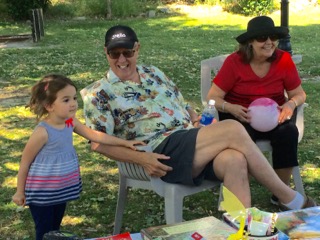 Guest speakers such as school counselors, hospice workers, staff from First 5 California, or specialists in stress management or technology, are featured at every other meeting.
Guest speakers such as school counselors, hospice workers, staff from First 5 California, or specialists in stress management or technology, are featured at every other meeting.
“So many grandparents are elderly and not really prepared for parenting issues that weren’t around when they were raising their own kids, such as how to manage technology,” May said.
About a quarter of the grandparents in the program don’t have a computer or cell phone, she said.
The Grandparent Project has been successful at encouraging grandparents to get together between meetings. “They bring their kids to those gatherings and the kids get to know each other. The children see that they’re not the only ones being raised by grandparents,” May said.
Leaders also provide grandparents with connections to services that may include therapists, attorneys, medical or dental care, a food bank, or social workers. “This year I even helped someone find a dietician,” May said. “There’s always a learning curve for the leaders in terms of finding help. We’re able to do the research the grandparents may need to find information.”
May said grandparents are left raising their grandchildren for many reasons. “One of the primary reasons is substance abuse on the part of the parents. Sometimes Child Protective Services has intervened, and other times the parents just drop their kids off with the grandparents and leave.”
Mental illness can play a role, as can medical issues. The GP currently has four children living with grandparents because a parent died of cancer.
The program has helped a number of grandparents gain guardianship of their grandchildren, which provides them with the comfort of knowing the kids won’t be taken away from them, May said. Being legal guardians also makes it much easier for them to help their grandchildren get medical care and deal with school issues.
Because May and the other two leaders are employees of CCOE, school confidentiality is extended to them, and they are able to communicate with the kids’ teachers and principals, and attend school meetings with grandparents.
“I’ve gone to IEP (Individualized Education Plan) meetings and Student Study Team meetings,” May said. “Sometimes it’s difficult for grandparents to get involved in special education, and they appreciate being walked through the process and helped with what to expect.”
The GP currently serves 67 kids in kindergarten through grade 12. There are 70 grandparents involved in the GP, with nine new families joining this year.
“I now have one great-grandmother who is 82 and she is raising a 10-year-old boy,” May said. “I’ve had many conversations with her about how she’s doing, as it becomes more difficult to understand his educational and behavioral challenges as he gets older.”
More than 300,000 grandparents in California have primary responsibility for their grandchildren, and about 65,000 of those caregivers are over the age of 65, according to a study from the UCLA Center for Health Policy Research.
May, who has been with the program since its inception nine years ago, said measurable outcomes are important to the GP.
“The way we’re able to assess the program is through the anecdotal responses we receive from grandparents,” she said. “We always ask them, ‘What can we do to improve our program?’ Most of the time they can’t think of any ways our services can be improved.”
The GP has a budget of just $17,000 and is funded through a contract with the Calaveras Health and Human Services Agency. The funding comes from Proposition 63, Mental Health Services Act, and is administered by Kathryn Eustis, Director of Youth Development and Prevention Programs at CCOE.
May said she feels “absolutely supported” by CCOE. “I could go to any one of their staff and feel like if I need help, we’re going to get that help.”
County office leaders, in turn, say they appreciate the support the program provides students and their caregivers.
“We have a large number of students being reared by grandparents and other relatives in our county, and those caregivers deserve extra support for taking on this challenge,” said Calaveras County Superintendent of Schools Kathy Northington. “The Grandparent Project helps build community among grand families and helps caregivers access the resources and support their students need to be successful in school.”
For more information:
- The Calaveras COE webpage about The Grandparent Project includes the schedule of support group meetings.
- A 2013 study from the UCLA Center for Health Policy Research examines the financial hardships faced by grandparents who are caregivers.
- The Grandparents Raising Grandchildren website features a collection of resources and first-hand reports.
- This Huffington Post article lists government programs and tax benefits that can help grandparents.

